|
| Sei in: Cinema e Medioevo ® Indice alfabetico dei film |
L'uomo con i pugni di ferro
(The Man with the Iron Fists)
2012, regia di RZA
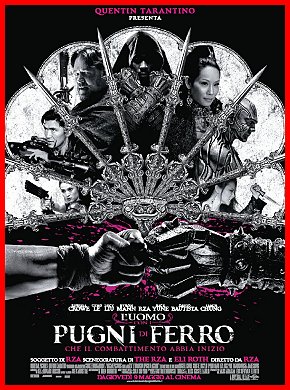
Scheda: Nazione: USA-Hong Kong - Produzione: Arcade Pictures, Iron Fists - Distribuzione: Universal Pictures International, United International Pictures, Strike Entertainment, Synca, Toho-Towa, Parco Co. Ltd. - Soggetto: RZA - Sceneggiatura: Eli Roth, RZA - Fotografia: Chi Ying Chan - Montaggio: Joe D'Augustine - Art Direction: Horace Ma Kwong Wing - Scenografia: Drew Boughton - Costumi: Thomas Chong - Musiche: Howard Drossin, RZA - Effetti speciali: Centro Digital Pictures Ltd., Gradient Effects, Post Matters - Formato: Color - Durata: 96' (107').
Cast: RZA, Russell Crowe, Lucy Liu, Rick Yune, Dave Bautista, Jamie Chung, Cung L, Byron Mann, Daniel Wu, Zhu Zhu, Gordon Liu, Andrew Ng, Kuan Tai Chen, Yoyao Hsueh, Telly Liu, Wen-Jun Dong, Zhan De Re, Lu Kai, Jin Auyeung, Ka-Yan Leung.
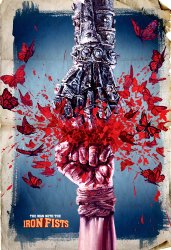
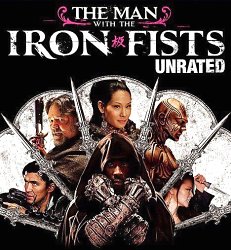
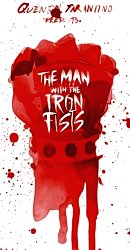
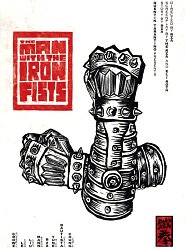
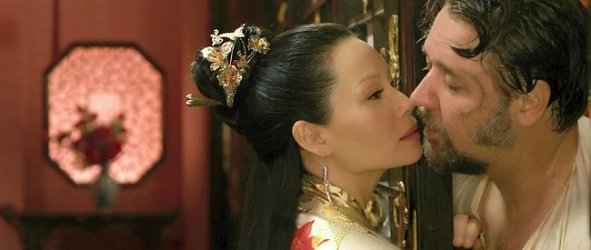
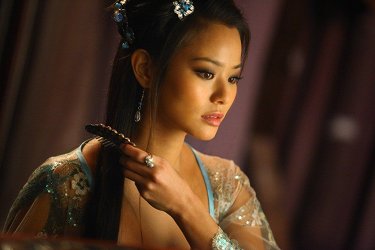
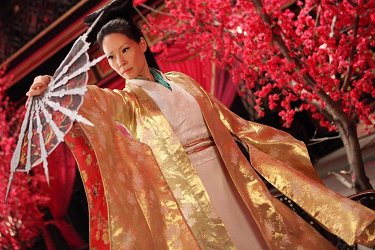
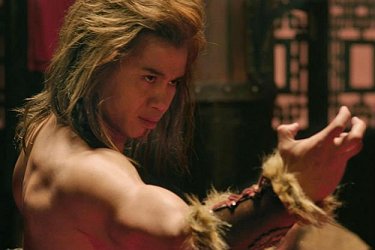
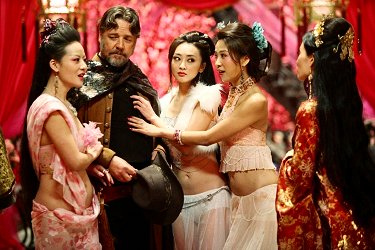
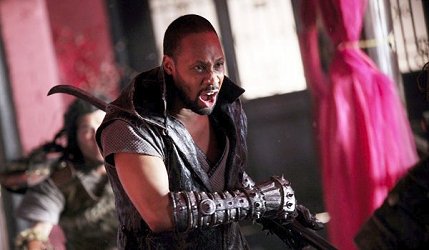
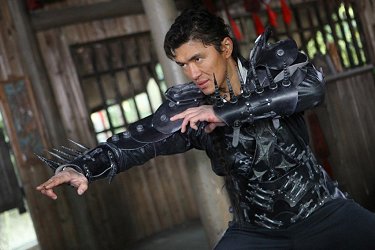
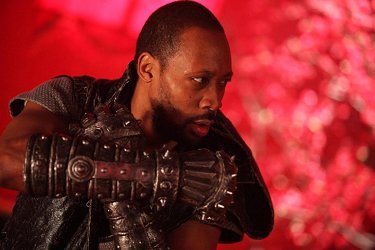
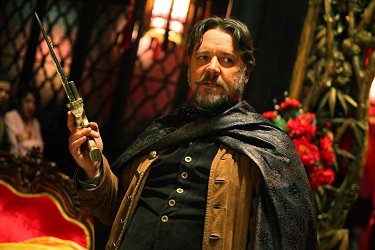
![]() Trama e commenti:
it.wikipedia.org
-
mag.sky.it
-
splattercontainer.com
-
cinematografo.it
-
facciadibronzo.net
-
comingsoon.it
-
filmup.leonardo.it
-
mymovies.it: «A Jungle
Village, in un'epoca imprecisata dell'antica Cina, un pacifico fabbro è
costretto a fabbricare armi per i peggiori predoni della zona, cercando di
raggranellare i soldi sufficienti per liberare la sua amata Lady Silk dalla
cattività del bordello in cui lavora, The Pink Blossom. L'arrivo in città del
mercenario inglese Knife coincide con una escalation di rese dei conti tra i
diversi clan, che finirà per coinvolgere tragicamente anche il fabbro Thaddeus.
La teoria del campionamento applicata al cinema. Andando ben oltre il
post-moderno, RZA interpreta la regia senza soluzione di continuità rispetto al
lavoro di
producer hip-hop, come un adolescente che mette in sequenza una serie
di passioni formative in un confuso discorso su riscatto e percorso individuale
di consapevolezza. Che parte dallo schiavismo (il suo Thaddeus Henry Smith
doveva comparire al fianco del Django tarantiniano prima che questi fosse
Unchained) e da una classica storia blaxploitation, con tanto di cameo di Pam
Grier, per approdare al kung fu dell'era Shaw Brothers, omaggiata attraverso
rimandi personaggi chiave di quell'epopea (Gordon Liu, Chen Kuan-tai). Uomini di
ottone, armature da cui vengono estratti coltelli, virtuosi delle lame,
presentazione dei singoli personaggi su sfondo nero, un tempio shaolin come ne
La 36. camera dello Shaolin, il duello nella sala degli specchi come in I
tre dell'Operazione Drago, capostipite del genere blaxploitation+kungfu ... E
così via, mettendo insieme materiale per trivia, ad uso e consumo dei fan più
nerd, in un anacronistico pastiche che non si pone minimamente il quesito di
essere credibile ma che tende comunque a prendersi pericolosamente sul serio. I
topoi del gong fu pian di Hong Kong sono tutti presenti, confermando
l'osservanza del fan devoto già tipica della carriera da MC e producer di
Robert "RZA" Diggs. Ma dove finisce la passione del completista maniaco e dove
comincia un'idea di cinema? Qualcosa che doni vita all'opera in sé,
permettendole di coinvolgere, trasmettere emozione e farsi ricordare? Il punto
sta proprio qui: la bulimia di citazioni e la voglia di stupire a tutti i costi
mal si sposano con la coesione di uno script cinematografico anche al di sotto
degli standard (bassi) del medio cinema action odierno. RZA palesa qui tutti i
suoi limiti, amplificati dalla necessità di ridurre a 2 ore la materia filmata,
con il risultato di introdurre una miriade di personaggi in voice over per i
primi 20 minuti abbondanti di film, ammazzando il ritmo dell'incipit
(paradossalmente uno dei punti di forza del cinema Shaw Brothers a cui il nostro
si ispira). Il percorso iniziato con il Wu-Tang Clan prima - campionando i
classici Shaw Brothers e regalando loro una nuova vita presso generazioni ignare
- e all'epoca della colonna sonora di Ghost Dog e Kill Bill poi,
per portare i sogni di una vita su grande schermo, è infine compiuto e, in
qualche modo, sorge spontaneo un moto di solidarietà per la passione infusa da
RZA nel suo progetto, infine coronato. Sorvolare sui suoi macroscopici difetti,
però, è altrettanto impossibile».
Trama e commenti:
it.wikipedia.org
-
mag.sky.it
-
splattercontainer.com
-
cinematografo.it
-
facciadibronzo.net
-
comingsoon.it
-
filmup.leonardo.it
-
mymovies.it: «A Jungle
Village, in un'epoca imprecisata dell'antica Cina, un pacifico fabbro è
costretto a fabbricare armi per i peggiori predoni della zona, cercando di
raggranellare i soldi sufficienti per liberare la sua amata Lady Silk dalla
cattività del bordello in cui lavora, The Pink Blossom. L'arrivo in città del
mercenario inglese Knife coincide con una escalation di rese dei conti tra i
diversi clan, che finirà per coinvolgere tragicamente anche il fabbro Thaddeus.
La teoria del campionamento applicata al cinema. Andando ben oltre il
post-moderno, RZA interpreta la regia senza soluzione di continuità rispetto al
lavoro di
producer hip-hop, come un adolescente che mette in sequenza una serie
di passioni formative in un confuso discorso su riscatto e percorso individuale
di consapevolezza. Che parte dallo schiavismo (il suo Thaddeus Henry Smith
doveva comparire al fianco del Django tarantiniano prima che questi fosse
Unchained) e da una classica storia blaxploitation, con tanto di cameo di Pam
Grier, per approdare al kung fu dell'era Shaw Brothers, omaggiata attraverso
rimandi personaggi chiave di quell'epopea (Gordon Liu, Chen Kuan-tai). Uomini di
ottone, armature da cui vengono estratti coltelli, virtuosi delle lame,
presentazione dei singoli personaggi su sfondo nero, un tempio shaolin come ne
La 36. camera dello Shaolin, il duello nella sala degli specchi come in I
tre dell'Operazione Drago, capostipite del genere blaxploitation+kungfu ... E
così via, mettendo insieme materiale per trivia, ad uso e consumo dei fan più
nerd, in un anacronistico pastiche che non si pone minimamente il quesito di
essere credibile ma che tende comunque a prendersi pericolosamente sul serio. I
topoi del gong fu pian di Hong Kong sono tutti presenti, confermando
l'osservanza del fan devoto già tipica della carriera da MC e producer di
Robert "RZA" Diggs. Ma dove finisce la passione del completista maniaco e dove
comincia un'idea di cinema? Qualcosa che doni vita all'opera in sé,
permettendole di coinvolgere, trasmettere emozione e farsi ricordare? Il punto
sta proprio qui: la bulimia di citazioni e la voglia di stupire a tutti i costi
mal si sposano con la coesione di uno script cinematografico anche al di sotto
degli standard (bassi) del medio cinema action odierno. RZA palesa qui tutti i
suoi limiti, amplificati dalla necessità di ridurre a 2 ore la materia filmata,
con il risultato di introdurre una miriade di personaggi in voice over per i
primi 20 minuti abbondanti di film, ammazzando il ritmo dell'incipit
(paradossalmente uno dei punti di forza del cinema Shaw Brothers a cui il nostro
si ispira). Il percorso iniziato con il Wu-Tang Clan prima - campionando i
classici Shaw Brothers e regalando loro una nuova vita presso generazioni ignare
- e all'epoca della colonna sonora di Ghost Dog e Kill Bill poi,
per portare i sogni di una vita su grande schermo, è infine compiuto e, in
qualche modo, sorge spontaneo un moto di solidarietà per la passione infusa da
RZA nel suo progetto, infine coronato. Sorvolare sui suoi macroscopici difetti,
però, è altrettanto impossibile».
![]() Plot Summary, Synopsis, Review: IMDb
-
allrovi.com
-
facebook.com
-
en.wikipedia.org
-
movies.nytimes.com
-
urbancinefile.com
-
reelfilm.com
-
cinemaseries.es
-
defilmblog.be
-
cinemablend.com
«Walking into the theater to see RZA’s The Man With The Iron Fists the
last adjective I expected to have on my mind walking out was “boring,” but
that’s really what the film delivers. While the director wears his love of the
kung-fu genre on his sleeve, the whole thing suffers from poor structure and
character development, a lack of consistent tone, and an inability to commit to
its own period. All set in feudal China in a town called Jungle Village, RZA’s
directorial debut has multiple stories working simultaneously, but the main
connection between all of them is how haphazardly they are put together. First
there’s the blacksmith (RZA), who no longer wants to make weapons and instead
wants to abscond with Lady Silk (Jamie Chung); then there’s Zen Yi (Rick Yune),
a warrior who learns that his father (Kuan Tai Chen) has been murdered by his
own brother, Silver Lion (Byron Mann), and returns home for vengeance; and
finally there’s Jack Knife (Russell Crowe), whose entire purpose is kept a
secret, though he and Silver Lion are both after the same thing: a shipment of
gold that is traveling through the town. Not only are all of these stories
interwoven in an arbitrary way that prevents the audience from investing in
what’s going on from scene to scene, the relationships and personalities of the
characters are never actually explored. In fact, it’s even hard to say that the
film has characters, as they’re more accurately described as “people tied to a
plot.” The Man With The Iron Fists doesn’t seem to know what kind of
movie it’s supposed to be. More often than not it takes itself seriously as a
dramatic kung-fu film, but this is regularly undercut by material you expect
from a spoof. It’s hard to take the plight of the blacksmith seriously, as he
becomes racked with guilt about the number of lives his weapons have taken, when
the central villain sounds like he is doing his own bad English redub. You want
to laugh at the ridiculously cheesy dialogue, but it’s weird when it’s mixed in
with the serious story of a warrior on a quest to avenge the death of his father.
If it’s not purposeful spoof then it’s simply bad storytelling, and in this case
I can’t tell the difference. And if it can’t commit to characters or tone, why
should we expect it to commit to its period setting either? While it’s not as
though the movie has cars driving around in the background of scenes, RZA never
seems to make any effort to show off the time period and none of the actors
commit to being in a past world. This would honestly be ignorable if it weren’t
for RZA’s voice-over narration throughout the film, which is told in a very
modern and is peppered with words like “motherfuckers” that immediately remind
the audience that its 2012 and they’re sitting in a theater. It’s the cherry on
top that makes the entire 96-minute runtime thoroughly unengaging. The Man
With The Iron Fists so desperately wants to be Quentin Tarantino’s Kill
Bill, but the final product isn’t anywhere near the same league. The film
does have some interesting choreography and the props department outdid
themselves when it came to weapons, but the only reason to focus in on that
stuff is because the rest of the movie is so unimpressive».
Plot Summary, Synopsis, Review: IMDb
-
allrovi.com
-
facebook.com
-
en.wikipedia.org
-
movies.nytimes.com
-
urbancinefile.com
-
reelfilm.com
-
cinemaseries.es
-
defilmblog.be
-
cinemablend.com
«Walking into the theater to see RZA’s The Man With The Iron Fists the
last adjective I expected to have on my mind walking out was “boring,” but
that’s really what the film delivers. While the director wears his love of the
kung-fu genre on his sleeve, the whole thing suffers from poor structure and
character development, a lack of consistent tone, and an inability to commit to
its own period. All set in feudal China in a town called Jungle Village, RZA’s
directorial debut has multiple stories working simultaneously, but the main
connection between all of them is how haphazardly they are put together. First
there’s the blacksmith (RZA), who no longer wants to make weapons and instead
wants to abscond with Lady Silk (Jamie Chung); then there’s Zen Yi (Rick Yune),
a warrior who learns that his father (Kuan Tai Chen) has been murdered by his
own brother, Silver Lion (Byron Mann), and returns home for vengeance; and
finally there’s Jack Knife (Russell Crowe), whose entire purpose is kept a
secret, though he and Silver Lion are both after the same thing: a shipment of
gold that is traveling through the town. Not only are all of these stories
interwoven in an arbitrary way that prevents the audience from investing in
what’s going on from scene to scene, the relationships and personalities of the
characters are never actually explored. In fact, it’s even hard to say that the
film has characters, as they’re more accurately described as “people tied to a
plot.” The Man With The Iron Fists doesn’t seem to know what kind of
movie it’s supposed to be. More often than not it takes itself seriously as a
dramatic kung-fu film, but this is regularly undercut by material you expect
from a spoof. It’s hard to take the plight of the blacksmith seriously, as he
becomes racked with guilt about the number of lives his weapons have taken, when
the central villain sounds like he is doing his own bad English redub. You want
to laugh at the ridiculously cheesy dialogue, but it’s weird when it’s mixed in
with the serious story of a warrior on a quest to avenge the death of his father.
If it’s not purposeful spoof then it’s simply bad storytelling, and in this case
I can’t tell the difference. And if it can’t commit to characters or tone, why
should we expect it to commit to its period setting either? While it’s not as
though the movie has cars driving around in the background of scenes, RZA never
seems to make any effort to show off the time period and none of the actors
commit to being in a past world. This would honestly be ignorable if it weren’t
for RZA’s voice-over narration throughout the film, which is told in a very
modern and is peppered with words like “motherfuckers” that immediately remind
the audience that its 2012 and they’re sitting in a theater. It’s the cherry on
top that makes the entire 96-minute runtime thoroughly unengaging. The Man
With The Iron Fists so desperately wants to be Quentin Tarantino’s Kill
Bill, but the final product isn’t anywhere near the same league. The film
does have some interesting choreography and the props department outdid
themselves when it came to weapons, but the only reason to focus in on that
stuff is because the rest of the movie is so unimpressive».
![]() Approfondimenti: Movie
Review
Approfondimenti: Movie
Review
Il sito ufficiale del film -1 - Il sito ufficiale del film -2
Conosciuto anche con i titoli: L'homme aux poings de fer; El hombre de los puños de hierro.